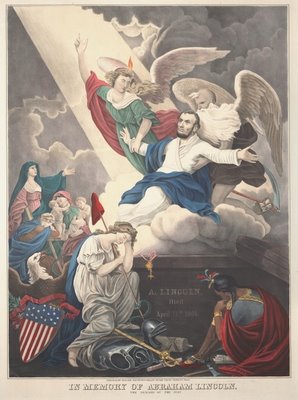 This post is a few years old, but given the recent discussion about a possible Lincoln Day in Virginia I thought it was worth re-posting.
This post is a few years old, but given the recent discussion about a possible Lincoln Day in Virginia I thought it was worth re-posting.
I highly recommend Barry Schwartz’s new book, Abraham Lincoln in the Post-Heroic Era: History and Memory in Late Twentieth-Century America (University of Chicago Press, 2009). There is an interesting section on the image of Lincoln during the Depression, which is a moment where, according to Schwartz his reputation had peaked only to decline following WWII. Schwartz not only surveys popular or institutional representations of Lincoln, but also tries to uncover the views of ordinary Americans. One of the more interesting sections is his analysis of how white Southerners viewed Lincoln from the turn of the twentieth century through the New Deal. Along the way, Schwartz mentions Thomas Dixon, D.W. Griffith, and Mary R.S. Andrews and a host of lesser-known writers.
I learned that on February 12, 1928, the Virginia House of Delegates rose for the first time in respect for Lincoln’s memory and adjourned “in honor of…the martyred President of the United States, whose death was a distinct blow to the South, resulting in a national calamity.” Not surprisingly, a number of public figures, including Lyon G. Tyler (son of of the president) and Reverend Giles B. Cook (Lee’s staff) offered a request to “to Repeal the Resolution of respect for Abraham Lincoln, the Barbarian…” and an eleven-page resolution. At least one newspaper editor encouraged its readers to “put aside old animosities.”
What I found most interesting was a 1929 survey of 4,658 boys and girls in Alabama living in Mobile, Montgomery, and Birmingham done by David Spence Hill. Hill asked the following: Of all persons whom you have heard, or read about, or seen, whom would you most care to be like or resemble”? One third of the boys and 60% of the girls named a relative or personal acquaintance; however, when it came to historic and public figures their answers were quite telling. Of the boys, 26% chose Washington while both Abraham Lincoln and Robert E. Lee came away with 5% each. The girls also overwhelmingly chose Washington, but Lincoln earned 3% while Lee only earned 2%. Schwartz’s analysis of the data is worth repeating in full:
Hill’s survey shows Lincoln’s prestige to have been feeble among school children, but he also documents the decline of the Confederate tradition. That Lincoln and Lee are named by virtually the same small percentage of respondents is surprising, given the belief about the South’s lingering resentments. No longer can negative Southern attitudes toward Lincoln be attributed to nostalgia for the Confederacy and its heroes. Moreover, Alabama children were discovering ideals in the present as well as the past. Boys ranked Charles Lindbergh (22 percent) just below George Washington. Girls also mentioned Lindbergh, along with film stars Clara Bow, Billie Dove, and Ruth Elder. Not the Confederate hero but George Washington and contemporary entertainers were competing against Abraham Lincoln for Southern children’s attention and respect. (p. 55-56)
One of the most popular publications of Confederate nostalgia was Tyler’s Quarterly Magazine and in 1939 one of its contributors complained that “praises for Lincoln emanate in almost equal fervor from practically every section of America.” Not too long ago newspapers inquired as to why Southern states were not taking part in Lincoln Bicentennial events. Of course, anyone who bothered to look would have noticed that there are numerous events throughout the South which acknowledge in one way or another his importance to American history. In fact, Lincoln is getting much more attention than both Lee and Jefferson Davis. My guess is that the author of the piece was driven more by popular perception than any serious understanding of Lincoln’s place in our national memory. One of the reasons why I find the study of memory to be so intriguing is that it has the potential to surprise. I am constantly struck by the extent to which our assumptions about the past or the ways in which previous generations interpreted the past deviate from our own.
So, if you are a white Southerner who respects and admires Lincoln, it turns out that you are in very good company.
I’d like to point out that those parts of the South with many Unionists embraced Lincoln early on and long afterwards. Lincoln Counties popped up in West Virginia in 1867 (fittingly its county seat is Hamlin), in Arkansas in 1871, and (interestingly) Mississippi in 1870. Clearly, white and black efforts lay behind these efforts.
Some “whites” do embrace Lincoln. However, the title is misleading. There is no quantification as to how many whites “embrace” Linc. In my opinion, an adjective, would lend more accuracy to the title. “Some” whites would be my thought. “More” would do it too. But the way it reads, some will think that all white southerners “embrace” Lincoln and that’s not the case.
I am simply offering some evidence that memory of Lincoln in the South is a bit more complex than what some might believe. Do with it what you will.